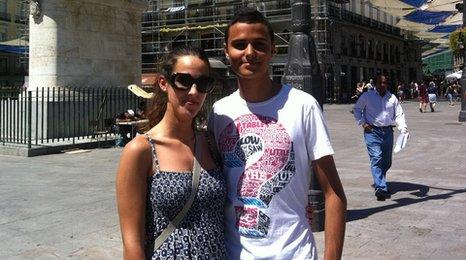Spanish state of Valencia split over public spending
- Published
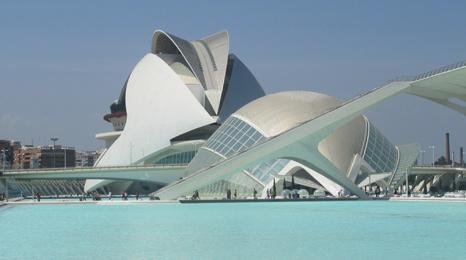
Valencia's City of Arts and Sciences (TCAS) cost 1.1 billion euros (£866m)
As Greece continues to struggle to make cuts to make sure it gets help to deal with its debts, Spain's government is getting closer to asking for a bailout from Europe.
Valencia is a region which has requested one billion euros from the Spanish capital Madrid.
"It has amazing beaches and weather," says 25-year-old Sarah Waddingham as she sets up her sun lounger on La Malvarrosa beach in Valencia.
"It's my second time here but I'm staying on much longer."
She and her friend Lucy Ellen, 24, have both come from Leicester for a week's holiday in Spain's third largest city.
They're among the five million international tourists that arrive in the country every year.
Apart from the beaches, Valencia's also famed for its paella, oranges and its football teams, Valencia and Levante.
But infamously, it's known for its white elephants, expensive buildings that locals consider financially troublesome.
"You mean the modern bit," says Lucy. "I do think it's a great part of Valencia apart from the usual beaches."
Big budget
That's principally the reason why these big modern buildings were built - to attract the world.
The City of Arts and Sciences (TCAS) is the one which gets most attention.
The white bleached structure is breath-taking in real life.
It stretches alongside the old Turia riverbed at more than eight kilometres long (five miles) and looms into the skyline.
TCAS includes an opera house, interactive science exhibit and the largest aquarium in Europe.
World-class no doubt, but the project cost four times its original budget at 1.1 billion euros (£866m).
Basically, that's more than half the 2 billion euros (£1.5bn) Valencia has requested from Madrid in a bailout plea.
For locals like Moises Querol, TCAS sums up everything that is wrong with Spain's regions.
"The local governments have too much money and want to be better than the other regions," he says.
"They've been overspending and it just doesn't give any value to the people."
Controversial cuts
Those feelings aren't hard to come by.
Street art on the walls in the old quarter shows police with batons attacking books and a family being weighed down by houses.

Cuts to education budgets has led to artists painting on Valencia's walls
That symbolises the controversial cuts to education and the housing bubble burst which has left many struggling.
There have already been student protests in the street this year.
But tourist workers like Maria Jover think the criticism is unfair.
She works for Generalitat Valenciana and on a bike tour round the city, says tourism is vital to the region's survival.
"We can't just stop investing in the region," she says.
"TCAS was a long-term project we had to finish. It's brought in an increase of tourists.
"But more importantly, it's allowed us to have big sponsored events like the America's Cup and the Formula 1, which we're still hosting.
"A few years ago those same young people were feeling proud of our new buildings. I think it's normal in a financial crisis to be angry about what we have spent money on."
White elephants
Valencia is not the only one of Spain's 17 autonomous communities with debt problems.
They all account to nearly half of public spending and their massive overspending has pushed the country's 2011 budget deficit over target.
The impact of overspending is obvious when you travel to other parts of the region.
Another so-called white elephant, Castellon Airport, which cost billions to make, has yet to see a commercial flight take off a year after it opened.
There's also Valencia Football Club. Construction of the 75,000-seat Nou Mestalla was stopped by financial constraints. The club says it has negotiated a new deal to complete the stadium in the next two years.
Lubza worked for the company that was originally delivering cement for its construction.
"It's sad, but like most things around Valencia these days, buildings are all half done," he says.
- Published19 July 2012

- Published19 June 2012
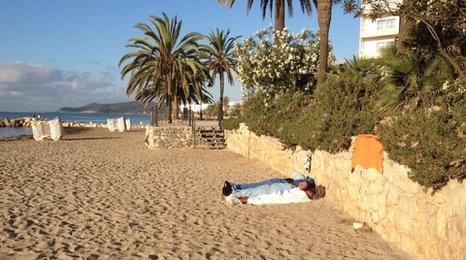
- Published11 June 2012
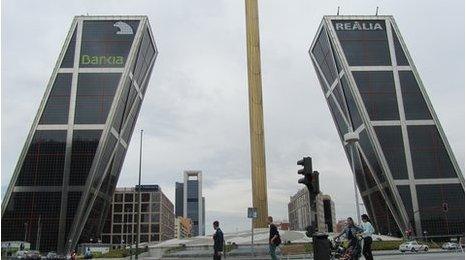
- Published15 May 2012
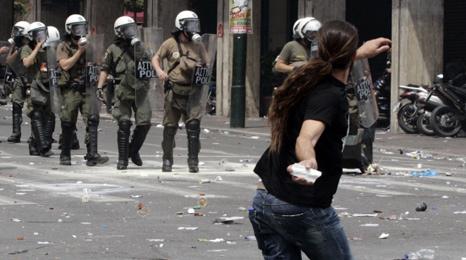
- Published11 August 2011
